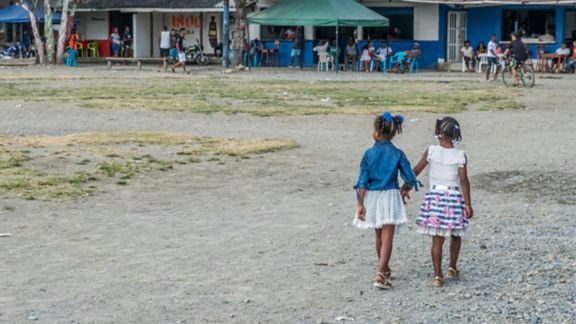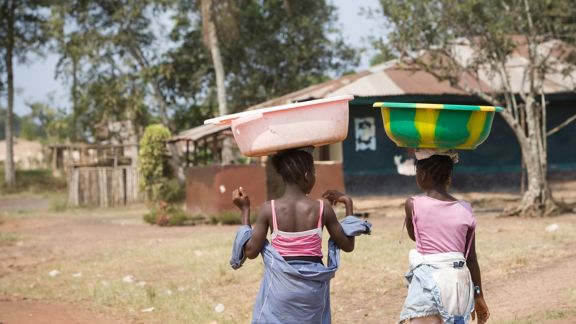Learning from a Decade of Maternal & Child Health Efforts in Mesoamerica

Author
Senior Fellow, International Programs
June 2025
NORC’s evaluation of the Salud Mesoamerica Initiative offers lessons about flexibility, local adaptability, and long-term planning in health systems.
A public-private partnership set a bold vision for health in Mesoamerica.
The Salud Mesoamerica Initiative (SMI) began in 2012 with an ambitious goal: transform maternal and child health outcomes for the poorest 20 percent of the population across eight countries in the region. This groundbreaking public-private partnership brought together the Gates Foundation, Carlos Slim Foundation, the governments of Canada and Spain, and the Inter-American Development Bank (IDB) in an unprecedented collaboration that would span a decade.
What made SMI unique was not just its scale but its approach. Unlike more conventional development projects, SMI employed a results-based financing model where countries received additional funding when they met predetermined targets. The initiative focused on improving reproductive services, neo- and antenatal care, and childhood health in Belize, Costa Rica, El Salvador, Guatemala, Honduras, Nicaragua, Panama, and Chiapas, Mexico. Equally innovative was the IDB’s role as implementer rather than just funder—a departure from their typical practice of disbursing loans and technical assistance.
NORC’s evaluation team spent nine intensive months examining this decade-long effort. We analyzed quantitative data collected from thousands of households and health facilities across all eight countries, conducted 69 key informant interviews with stakeholders ranging from ministry officials to frontline health workers, and facilitated 27 focus groups with community health workers, midwives, and families. Our goal was not just to measure what changed, but to understand how and why those changes occurred—or didn’t occur—in different contexts.
The results of our research showed surprising variability in outcomes across countries.
Our evaluation revealed a surprising lack of consistent patterns across countries and indicators. Honduras, Guatemala, and Belize showed stronger results while countries such as Panama lagged behind. Some health indicators improved dramatically while others showed little change. This variability isn’t a shortcoming of the research but rather an important insight: context matters enormously in public health interventions.
From External Rewards to Intrinsic Motivation
One of the most compelling findings was how motivation evolved among health care workers. Initially driven by financial incentives, many frontline health workers eventually transitioned to intrinsic motivation. As one participant explained, it became about “getting the things done in the way that they were supposed to do” because it was the right thing to do, not just for monetary rewards. This transformation speaks to something fundamental about human motivation that transcends this specific initiative. What began as a financial incentive evolved into something more powerful: health care workers doing quality work because ‘it’s good’—not just for rewards. This transformation in motivation may be SMI’s most enduring legacy.
Quality improvements outpaced coverage expansion.
The evidence consistently showed that improvements in quality of care were generally more substantial than improvements in coverage. Standardization of care, clear protocols, and consistent training proved effective across contexts.
Some regions showed surprising resilience during COVID-19.
Contrary to what many expected, the pandemic’s effects varied significantly across locations. While we did observe decreases in health care-seeking behaviors, including vaccinations and routine care, some regions adapted remarkably well by increasing field visits and implementing alternative care methods.
Early sustainability planning was key to programs’ success.
Perhaps the most significant implication for future public health work is the critical importance of prioritizing sustainability from day one. Programs that were implemented early and became institutionalized were those that lasted. The stakeholders we interviewed consistently emphasized that sustainability cannot be an afterthought that comes “too late in the process.”
Multiple factors threatened long-term sustainability: personnel turnover, disruptions in medical supply chains, equipment maintenance challenges, and government changes.
Main Takeaways
For policymakers and health system leaders, these findings suggest several key lessons. First, quality improvement initiatives can succeed even in resource-constrained settings when properly implemented and supported. Second, early and consistent focus on institutionalizing changes is essential for long-term impact. Third, adaptability to local contexts may be more important than standardized approaches across regions.
The mixed results across countries and indicators shouldn’t be viewed as a disappointment but rather as a realistic picture of the complex challenge of improving health systems. Even the most well-designed initiatives must contend with the reality that health outcomes are shaped by countless factors beyond any single program’s control.
As global health and development organizations design future initiatives, the lessons from Salud Mesoamerica suggest that humility, flexibility, and a long-term perspective are essential. Health system strengthening isn’t about quick wins but sustained commitment to improving the quality of care for those who need it most.
Suggested Citation
Menendez, A. (2025, June 4). Learning from a Decade of Maternal & Child Health Efforts in Mesoamerica. [Web blog post]. NORC at the University of Chicago. Retrieved from www.norc.org.







